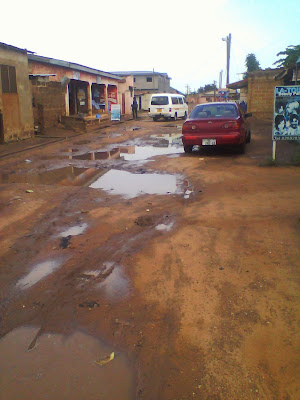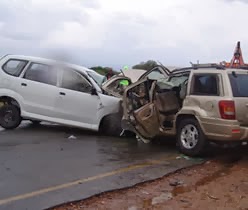video of dirty and dusty road. Video credit: Owusu-Ansah Bridgette.
Driving in Ghana can be a very enjoyable experience in some parts of the world but it can be a death trap in some nations. Ghana for one seems to be an example of the latter nations. One of the first spectacles that strikes any visitor to Ghana is the condition of the roads and heavy traffic especially in Accra. The main roads connecting the many other cities to Accra and circles such as the Nkrumah, J.B Danquah, Obetsebi-Lamptey and Ako-Adjei circles are in fairly good condition. However as soon as one turns from these main highways into the residential areas such as East and North Legon and Cantoments, one is greeted with a few good roads and many others with potholes several feet wide and deep even in these high income areas.
On the other hand, in places such as Dansoman, Madina, Adenta and Ofankor, this is a nightmare. During the rainy season especially during the latter part of June, drivers are faced with the problem of not knowing how deep these potholes on roads now filled with water are. Drivers just hope that the pools of water in the roadways are not too deep to swallow their vehicles and as such throw caution to the winds and just drive through.
The use of gravel then comes as a solution to help cover up potholes and also to surface new roads.This however leads to flying gravel stones smashing windscreens of oncoming vehicles and thus needs to be seriously considered. For a country that does not manufacture vehicles of any kind but rather has to rely on importation of both vehicles and vehicle parts, the economic impact of broken vehicle parts is an enormous one.
 |
| A dusty and exposed road. Picture credit: Owusu-Ansah Bridgette |
 |
| An exposed road with potholes filled with water. Picture credit: Owusu-Ansah Bridgette. |



